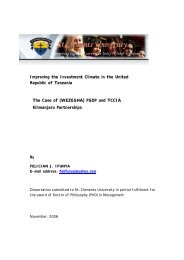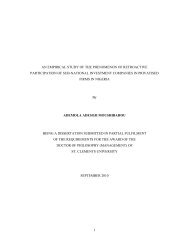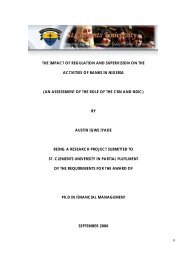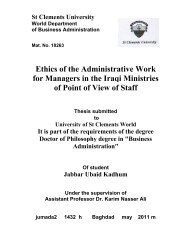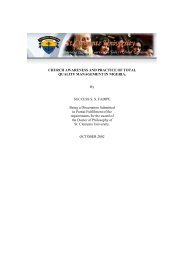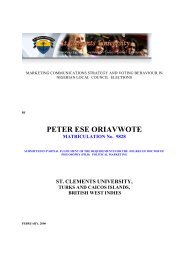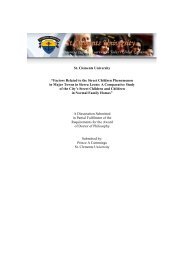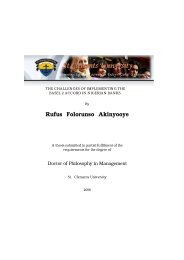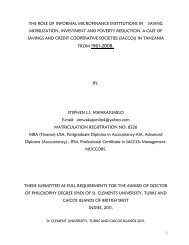- Page 1 and 2: ASSESSMENT OF PERFORMANCE MEASUREME
- Page 3 and 4: Table of Contents Page Chapter One
- Page 5 and 6: 2.34 Strategy implementation framew
- Page 7 and 8: CHAPTER 1 1.1 BACKGROUND TO THE PRO
- Page 9 and 10: Notwithstanding all these attempts,
- Page 11 and 12: 5. To ascertain the extent of the r
- Page 13 and 14: 1.7 LIMITATION OF THE STUDY The maj
- Page 15 and 16: Strategic business unit: A discrete
- Page 17 and 18: CHAPTER TWO LITERATURE REVIEW 2.0 D
- Page 19 and 20: 2.1 STRATEGIC MANAGEMENT DEFINED Ch
- Page 21: that the core of general management
- Page 25 and 26: 2.3 STRATEGY MANAGEMENT DYNAMICS: C
- Page 27 and 28: a. PESSIMISM CRITERION: This criter
- Page 29 and 30: competitive strategy in emerging in
- Page 31 and 32: Iv. Diseconomies of scale: In a sit
- Page 33 and 34: A Split of Factor: Sometimes, the c
- Page 35 and 36: service organization, specialized l
- Page 37 and 38: defendable position for the firm to
- Page 39 and 40: . Demographics: Another source of d
- Page 41 and 42: substantial costs of labour settlem
- Page 43 and 44: elative to the total, its divestmen
- Page 45 and 46: this segment. It may find it desira
- Page 47 and 48: 2.9 COMPETITION IN GLOBAL INDUSTRIE
- Page 49 and 50: firm’s first foray overseas invol
- Page 51 and 52: national markets, the global compet
- Page 53 and 54: case, even a small improvement in c
- Page 55 and 56: Trends of Global Competition There
- Page 57 and 58: possibly India may ultimately emerg
- Page 59 and 60: shifts in relative cost relationshi
- Page 61 and 62: often in a good position to think u
- Page 63 and 64: currently available products. Buyer
- Page 65 and 66: industry unsettled and probably cha
- Page 67 and 68: materials to another, such as finis
- Page 69 and 70: compete successfully with its rival
- Page 71 and 72: Retailer Retailer Manufacturer Reta
- Page 73 and 74:
4. Attitude: Consumers are able to
- Page 75 and 76:
(1) The hierarchy of strategic inte
- Page 77 and 78:
performance. The feedback from stra
- Page 79 and 80:
In a little departure from Kazim (2
- Page 81 and 82:
of words. The various parts of the
- Page 83 and 84:
Quality as part of corporate strate
- Page 85 and 86:
Different levels of strategy: Struc
- Page 87 and 88:
used for tapping solar energy, or a
- Page 89 and 90:
gap Analysis Past strategy New Stra
- Page 91 and 92:
According to the BCG, a company mus
- Page 93 and 94:
EVR Congruence is a refined version
- Page 95 and 96:
ZONE GREEN YELLOW RED capability, a
- Page 97 and 98:
which found a positive correlation
- Page 99 and 100:
more than a strong and appropriate
- Page 101 and 102:
Aggregate economic activity compani
- Page 103 and 104:
value of all goods and services pro
- Page 105 and 106:
service requirements, and deciding
- Page 107 and 108:
(b) R & D (Research and Development
- Page 109 and 110:
Human resources management is a str
- Page 111 and 112:
Liftman et al (1994) stated that po
- Page 113 and 114:
1. Environmental problems and Oppor
- Page 115 and 116:
the environment remains supportive
- Page 117 and 118:
A regional strategy implies that a
- Page 119 and 120:
ii. What objective will be establis
- Page 121 and 122:
2.28 STRATEGY CHOICES Jauch and Glu
- Page 123 and 124:
increase market share substantially
- Page 125 and 126:
different future periods. The logic
- Page 127 and 128:
COST-REDUCTION STRATEGIES: Luftman
- Page 129 and 130:
marketing, as a process requires ti
- Page 131 and 132:
organization may triggers a bigger
- Page 133 and 134:
performed in a sequence and accordi
- Page 135 and 136:
Loewen J. (1997), Hill and Jones (1
- Page 137 and 138:
strategy formulation, strategy impl
- Page 139 and 140:
Premise control: In the strategy fo
- Page 141 and 142:
The strategic surveillance of exter
- Page 143 and 144:
5. Installing and maintaining appro
- Page 145 and 146:
a) Systemic Barriers: Systemic Barr
- Page 147 and 148:
approach is to have both the planni
- Page 149 and 150:
Strategy Evaluation Thompson (1995)
- Page 151 and 152:
objectives, while at the same time
- Page 153 and 154:
ecent high profile financial report
- Page 155 and 156:
goods and services benefit the comm
- Page 157 and 158:
2. Aligning people-communicating th
- Page 159 and 160:
firm’s liquidity. The quick ratio
- Page 161 and 162:
Financial analysts stated that it i
- Page 163 and 164:
This limitation of canonical correl
- Page 165 and 166:
favours the cumulative l distributi
- Page 167 and 168:
negates or dilutes the effectivenes
- Page 169 and 170:
The Bs are the coefficient (or para
- Page 171 and 172:
The stochastic error term: Besides
- Page 173 and 174:
To get a better feeling for these c
- Page 175 and 176:
5. Observed frequencies cannot be t
- Page 177 and 178:
2. The Pearson Product Moment Corre
- Page 179 and 180:
For our secondary data, the followi
- Page 181 and 182:
4.1 INTRODUCTION CHAPTER FOUR DATA
- Page 183 and 184:
company was N11, 617,978b, given a
- Page 185 and 186:
2005, SHF of the company increased
- Page 187 and 188:
ecame N6, 472,698b given a growth r
- Page 189 and 190:
the SHF of the company rose to N370
- Page 191 and 192:
N618, 407m representing 632.69% dro
- Page 193 and 194:
Earning translating into 26.26%. In
- Page 195 and 196:
compared to last year. In 2003, the
- Page 197 and 198:
In 2004 GE of Zenith Bank was N23,
- Page 199 and 200:
2004, it rose again to N1, 002,024
- Page 201 and 202:
N4,243,286b giving us a 0.77 percen
- Page 203 and 204:
growth. In 2003, the SHF of the com
- Page 205 and 206:
2003, the company reported a droppe
- Page 207 and 208:
moved to N2,128,304 billion that me
- Page 209 and 210:
epresenting 29.45 percent growth. I
- Page 211 and 212:
percent growth. In 2004, the Turnov
- Page 213 and 214:
Table 4.16: CROSS SECTIONAL DATA FO
- Page 215 and 216:
General normal equation formula:
- Page 217 and 218:
means that the Share Holders’ Fun
- Page 219 and 220:
HYPOTHESES 2 There is no significan
- Page 221 and 222:
Table 4.27: Summary of chi-square a
- Page 223 and 224:
Table 4.31 Summary of chi-square an
- Page 225 and 226:
Table 4.34 Summary of chi-square an
- Page 227 and 228:
Table 4.38 Summary of chi-square an
- Page 229 and 230:
In discussing our result we found o
- Page 231 and 232:
Our survey also revealed that 85.71
- Page 233 and 234:
number of the respondents believed
- Page 235 and 236:
Responses on whether firms have str
- Page 237 and 238:
Looking at the client satisfaction
- Page 239 and 240:
Koch (2000) listed the following as
- Page 241 and 242:
CHAPTER 6 SUMMARY OF FINDINGS, CONC
- Page 243 and 244:
Another finding of the study based
- Page 245 and 246:
There is need for further studies t
- Page 247 and 248:
Jauch Lawrence and Glueck William (





